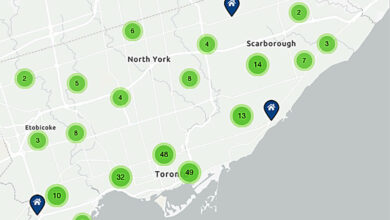“We are working to improve patient’s health care experience”
David Jensen - Communication branch in the Ministry of Health of Ontario
Ontario Health care system has a serious crisis and it’s not a recent issue. During the last few years we have received many signs: patients awaiting treatment for months, canceled surgeries, children and elders waiting for hours in the corridors of emergency hospitals. The health care in Ontario can’t even respond to routine consultations because they are beyond capabilities.

System is struggling, health care is the biggest budgetary of Ontario, but we can’t close our eyes to reality. If cuts in the budget means poorly health care what are we going to do in the next few years? People are getting older and older and bed at hospitals are necessary; we can’t deny reality, our healthcare system struggles to provide even routine care.
There are plans to reduce the number of Public Health Units from 35 to 10, cut 44 positions at the Ontario Telemedicine Network, cut $22 million from cancer screening programs, cut planned mental health funding by more than $330 million per year, cancel all new planned overdose prevention sites, and the list is extended. Milénio Stadium talked with David Jensen, responsible for the communication branch in the Ministry of Health, to clarify their strategies.
Milénio Stadium: What are the plans to improve the health system in Ontario?
David Jensen: Ontario is working to build a connected health care system to improve patient and caregiver experience and strengthen local services. These changes will make it easier to navigate the system. Providers will work together to take the guesswork out of transitions, where we know patients often feel lost and unsupported.
We are working to improve patient’s health care experience and services through:
One integrated team of health care providers working together to meet your needs
A medical record that both you and your providers can access easily
Help in navigating the public health care system 24/7
MS: Do we have enough doctors in Ontario?
DJ: Ontario is producing and attracting more physicians than ever before. Physician supply projections consistently exceed population growth and are projected to continue doing so.
In 2018, there were 31,404 physicians practising in Ontario. This has increased by 32.1% (from 23,767) while the population grew by 11.2%. Growth in physician supply is projected to consistently exceed population growth, leading to an average annual net increase of approximately 616 physicians each year until 2027.
Ontario’s physician supply and specialty mix are closely monitored. The ministry works with Ontario medical schools and other partners to plan the number and location of medical training positions as well as the mix of physician specialties according to the current and future needs of patients and the health care system.
The ministry recognizes that there is still more work to be done. Ontario is experiencing challenges with the geographic distribution of physicians and physician services in some areas of the province. The ministry is working with physicians, communities, and other partners to improve access. Some of the provincial initiatives designed to improve the distribution of physicians include:
Offering Ontario residency training to internationally-educated physicians in exchange for a commitment to practice medicine in an Ontario community other than Ottawa or Toronto and its adjoining municipalities, for an agreed-upon period of time upon completion of training;
Increasing opportunities and financial incentives for physicians to enter family practices in areas identified as being in high need of physicians;
Funding Distributed Medical Education (DME) learning opportunities, which expose medical students and residents to practices in smaller, rural, and remote communities, aiding recruitment and retention of physicians there; and
Assisting communities with their health professional recruitment and retention efforts through the HealthForceOntario Marketing and Recruitment Agency (HFO MRA).
MS: How is the lack of family doctors justified? And how is the delay in emergency care justified?
DJ: The government doesn’t feel either of these situations are justified.
MS: What are the most common diseases in the province?
DJ: The most common diseases in Ontario are cancers, cardiovascular diseases, chronic respiratory diseases and diabetes.
MS: The Minister does not support distance consultations anymore, why?
DJ: Ontario continues to support telemedicine consultations and the Northern Health Travel Grant Program which supports patients who have to travel to see a health care provider.
MS: You are going to reduce health units from 35 to 10 in Ontario. Do we have reason to be worried?
DJ: The government is taking a comprehensive approach to modernize Ontario’s health care system, which includes a coordinated public health sector that is nimble, resilient, efficient, and responsive to the province’s evolving health needs and priorities. The government has not finalized decisions about the structure of the health units.
Our government made the decision to maintain the current cost-sharing arrangements for public health this year to provide municipalities with additional time to find efficiencies that will ensure the sustainability of these critical shared public health services.
While the way in which we are implementing our plan to strengthen public health has changed, the need to do so has not.
On October 10, 2019, the government announced a new municipal advisor to lead the renewed consultation on strengthening and modernizing public health. The advisor will also lead consultations on emergency health services.
These consultations are expected to determine the best way to deliver critical services so that the government can continue to meet the evolving needs and priorities of Ontario’s families. Strengthening both public health and emergency health services is part of the government’s plan to end hallway health care and build a modern, integrated and sustainable health care system.
Through this process, Ontario will continue to engage with the Association of Municipalities of Ontario, boards of health, public health experts, associations, as well as affected unions and other partners. The consultations will start in the fall 2019 and are expected to conclude in 2020.
There is a significant role for public health to play within the larger health care system and it will continue to be a valued partner.
Sara Oliveira/MS








Redes Sociais - Comentários